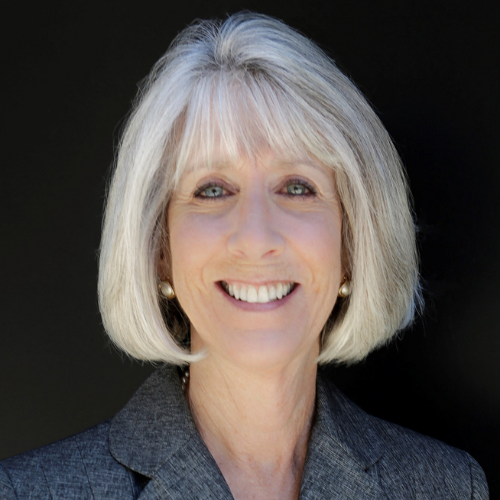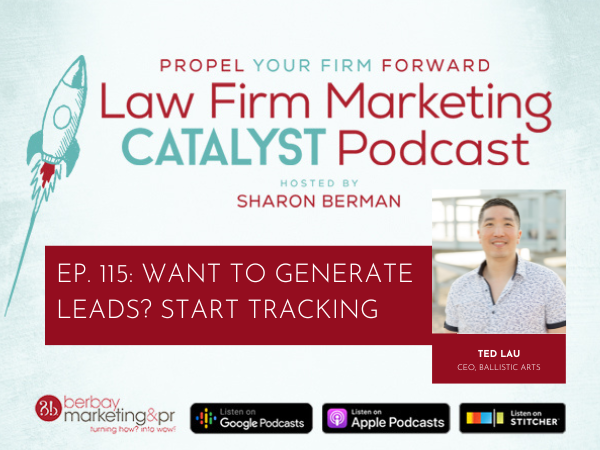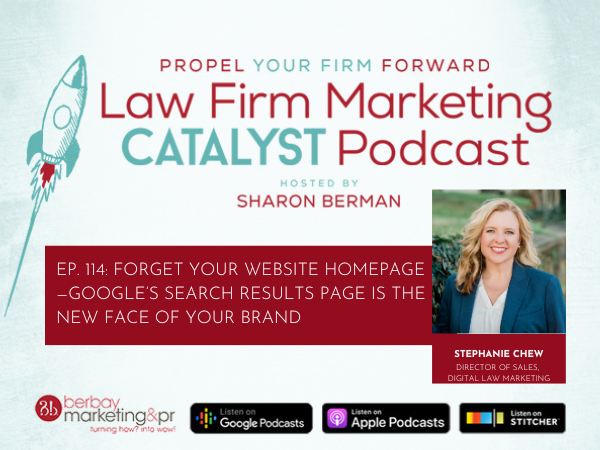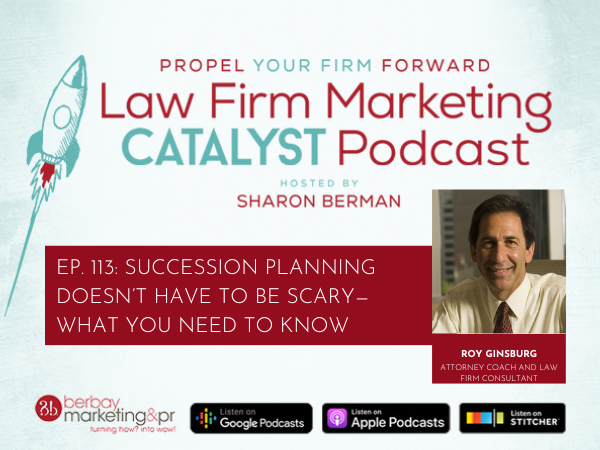Episode 92
What you’ll learn in this episode:
- How lawyers talked about marketing and business development decades ago.
- The change in how prospective clients choose a law firm.
- How marketing has evolved through the years.
- The internet’s impact on law firm marketing and business development.
About Helene Bizar:
Helene Rubinfeld Bizar has been the Director of Administration at the Law Offices of Michels & Lew since 2005. Being a small firm, she is responsible for all the non-legal aspects of successfully running a firm, from personnel management, technology, financial requirements, securing service contracts, managing insurance needs, negotiating leases and seamlessly transitioning the firm through the remote working process during the pandemic – it’s all a daily priority juggling act!
She has spent the last 44 years working in law firms in a variety of capacities. Having previously been the Controller of a major motion picture advertising agency, along with a background in psychology and being a Certified Legal Administrator through the UCLA School of Law, she is well grounded with the tools and calm demeanor for law firm administration.
Helene has been a speaker at several Los Angeles County Bar Association Small Firm Section meetings on various topics related to law firm management and she has contributed articles to the Association of Legal Administrators chapter newsletters, an organization for which she served on the Board of Directors for many years.
Additional resources:
Episode Transcript
Episode 92: The Evolution of Law Firm Marketing with Helene Bizar, Director of Administration at Law Offices of Michels & Lew
Sharon: Welcome to the Law Firm Marketing Catalyst podcast. Today, my guest is Helene Bizar, Director of Administration at the Law Offices of Michels & Lew which specializes in medical malpractice and personal injury. Helene has longtime experience working in law firms and has worn many hats including that of marketing. We’ll hear all about her career path today and what she’s learned about working with lawyers and with legal marketers. Helene, welcome to the podcast.
Helene: Thank you for having me, Sharon, it’s a pleasure.
Sharon: So glad to have you. I’m really looking forward to this because we’ve known each other a while, but I haven’t heard—I’ll call it your story in a sense, but tell us about your career path.
Helene: O.K., I’m not going to go too far back, but I did work in a motion picture advertising agency doing accounting work and the production manager was married to an office manager of a very large, prestigious Century City law firm and they were looking for someone to assist in their accounting department and I was ready to make a change. That’s how my legal entry began—or my entry in the legal field—and I worked for that firm close to ten years. I did start in their accounting department and during my term there, I became aware of a class at UCLA through their School of Law and it was in certification, legal management and administration. So, I took the course and it was wonderful, very challenging but good and that really launched my career into the management side of law firms. When I left that firm, I went to a thirty-attorney firm as their administrator and that was in 1986, and while I was there the firm—they were kind of divided. One side was more insurance defense; one side was more general practice litigation and they decided to split. I maintained a dual management administrative role and managed both firms simultaneously until they were able to wind down the business and each go their separate ways.
That was my next entrée to another law firm where I spent almost close to 7½ years. And that was really my first involvement with any marketing and that was the early 1990s and as I’m sure you know, in the ‘70s, law firms couldn’t advertise. It wasn’t until 1977 when there was a Supreme Court case, Bates v. State Bar of Arizona, that struck down the prohibition of attorneys’ advertising. The concept is relatively new in the scheme of things, and it took a long time for attorneys to embrace the concept. TV advertising was certainly frowned upon; it didn’t seem prestigious. Law firms look at it as something kind of cheesy. So, they weren’t welcoming and embracing to the concept. My exposure in the early days of marketing was really more in terms of sending out newsletters, attorneys having speaking engagements, that type of thing.
When I left that firm, I decided I needed a break from administration and I partnered with someone who had an attorney recruiting background and we opened up our own practice, an attorney recruiting firm and we were both very well connected with administrators and recruiters, and we thought it would be a good fit and something different to try and be our own bosses. After a few years, we decided it really wasn’t satisfying. We had lots of job openings, but we really couldn’t get the quality candidates to work with us to make a move.
Things were very different back in the ‘90s than they are today. In 2005, I joined my current firm and that’s really where I cut my teeth on marketing because the concept was more widely accepted and it was easier to persuade attorneys to put their toe in the water and check it out and see how it went. I was very fortunate that my firm was visionary because the managing partner in 1980, which was early for marketing, launched a TV advertising campaign on the Spanish stations and it was wildly successful.
Sharon: Wow, that is visionary! And I can see why you would have been the only one.
Helene: Yes, and especially because he was able to identify that the Hispanic community was very underserved in the medical world. They didn’t have access to the top doctors and their resources were different. So, there were many more birth injuries that occurred and that was kind of our niche market, and still is, traumatic birth injuries, and he was even smart enough to have developed a tagline back then which was, “Abogados para los niños” which is “attorneys for the children” and even today people remember that and sometimes will say, “I saw you on TV” and we have not advertised on the Spanish stations in quite a long time. We’ve diverted to other advertising media. So, that was kind of the launching of my firm’s advertising.
Sharon: I’m curious because when I came into law firm marketing, even though it was 25, 30 years ago, it was underway. It was a long time after the Supreme Court decision. How did lawyers talk about marketing? It’s only recently that it hasn’t been a dirty word in the sense or sales hasn’t been a dirty word in law firm marketing. Did they talk about business development? What terminology did they use?
Helene: In my exposure early on in my career, it was because I worked at a large, more of a general practice firm, the focus was cross-selling. So, if you were a probate attorney and your client needed something that was of a corporate need, they would try to cross-sell within the firm. I can’t remember that there was a formal marketing program back in 1977 when I first entered law firms. It really didn’t start to emerge until the late ‘80s, early 90s and even today, my experience has been those attorneys who embraced the concept of marketing and advertising don’t actually want to do the work themselves; they want someone else to do the work, which I think you understand.
Sharon: Yeah, I do. I can understand that from several perspectives. So, was there a formal cross-selling program? I mean did the partners meet and when they were talking about accounting or the management of the firm, were they talking about, “We’ve got to cross-sell?” Was it just pounding on the table? I’m rather curious because I wasn’t doing this then.
Helene: At the first firm that I was at, which again was a large Century City firm, I wasn’t privy to those meetings. I just know in conversations that I would hear that they would always emphasize that business development equated to cross-selling within the firm. There weren’t really any formal outside attempts to market, though I do think some of the attorneys would speak occasionally if they had a connection with a particular group, but it wasn’t in any kind of formalized way and it was always an issue too because in that environment, which is different from being in a medical malpractice firm, the billable hour was the golden rule. People didn’t want to give up their hours to somebody else and where I am now, we’re on a total contingency basis. So, it’s very different than being in a defense firm or a general practice firm. The world has changed. The internet is here. The options are broad for marketing.
Sharon: Was it jarring when you moved from a firm that worked in billable hours to one that was a contingency? For you, was that a little jarring? I guess it’s a word that keeps coming to mind. Was it like, “Oh, my gosh?”
Helene: It was very different in many respects, not just that. I do think being in a contingency firm promotes a more relaxed environment and I’ll tell you our attorneys work long, hard hours, but there isn’t that same kind of pressure to meet an hourly goal, but my firm is also very different culturally. I’ve been in very large firms. It was a difficult decision for me to decide if I wanted to join this firm because I was actually, conceptually, moving down. I was going to a smaller firm and I was concerned about how that was going to look on my résumé if I wanted to change positions down the line, but it’s become a non-issue. This firm is very familial. It is cohesive. The people have been there, most well over 25 years, 30 years, some 40 years; some graduated high school and came to the firm. The firm is 40 years old and there are people that started in the beginning and are still here. I’ve been at the firm over 16 years, and I feel like the new kid on the block. So, it’s a very different experience.
Sharon: It must be. I mean I’ve seen the firm in action. It’s been several years, but I’m just blown away by the fact that the leadership of Phil Michels decided to advertise on TV early on. Talk about breaking a glass ceiling, in a sense.
Helene: Most of the people at our firm do speak Spanish and they can very well relate to the clients and our marketing has always been to—well, there’s divergent marketing. There’s the marketing to the attorneys and there’s marketing to the potential client. The client marketing has been focused largely in I’ll say the Inland Empire area where there had been—I think the dynamics are changing now—but had been a very large Hispanic population and again the doctors, the regional centers, the medical facilities were not of the level of the UCLAs and the Cedar Sinais that were—it’s rare that we would go against one of those facilities. So, we filled a niche and there’s a cultural issue too, because with many Hispanics, if something goes wrong in the course of a pregnancy or a birth, they feel that they are responsible. So, we have to get over that hurdle with them and let them know it’s not their fault and get to the source of what did happen and what caused the birth injuries, and these are really heartbreaking catastrophic injuries where a child will need a life care plan for the rest of their lives. Our cases are often what they call HIE cases; their hypoxic, ischemic, encephalopathy, where there is a deprivation of oxygen to the brain and limited blood flow. It’s so detrimental to these children and heart-breaking. We see them coming in in wheelchairs with all kinds of apparatus to help them breathe and suction and G-tubes, and as a firm, we fight so hard for them so we can get them a settlement that will allow them access to all of the medical needs that exist for them.
Sharon: I’m curious if you’ve seen a change in the way that prospective clients choose the firm or how they make a decision about which firm to choose, and the same with how lawyers who refer to the firm, has it changed in say the last 15 years in terms of what you need to emphasize to them in order to stand out? Does that make sense?
Helene: Yes, it makes sense and I’m just trying to think where to start to answer your question. We track, every week, our marketing. We have a software program where we enter every phone call that comes into our firm or any letter than comes into our firm into our system and we track the source of how that person or attorney found us and we’re able to see a trend by doing that and again, there are two different marketing venues I would say. We market to attorneys, and we do that through magazines and the newspapers that are indigenous to the legal industry. We attend a conference every year that’s put on by the Consumer Attorneys Association of Los Angeles—the handle is CAALA—that’s a huge conference for attorneys and it’ll draw 3,000 minimum attorneys typically and we have an exhibit booth there every year. So, we make ourselves visible. We let people know that we have an in-house medical director that reviews cases. We emphasize that we have great resources to analyze cases, whether or not they have credibility, if they have value and that has been very successful for us.
On the other side, if we’re marketing to prospective clients, we have to be more strategic and do target marketing and we’re also—everyone who knows about personal injury firms knows about MICRA which is a 1975 law, it’s the Medical Injury Compensation Reform Act which limits the case value, non-economic damages, to $250,000. So, we are a firm that typically will not take those cases because they are too expensive to litigate to really get the client a decent settlement. Our market is in excess of $2 million, $3 million; those are really the catastrophic cases. Potential clients now have more ways to find us because of the internet and the worldwide web. I mean there’s Instagram; there’s Facebook, AVVO, Martindale-Hubbell, Google keyword searches. The internet is God.
Sharon: I know, yes, there’s so much that it’s overwhelming. There’s always a debate about whether—it’s been a while—but the debate about whether clients choose a personal injury firm because they see how much money you’ve gotten for other people, or they choose it because they feel like you’re warm and fuzzy in that sense. Has that changed or has one gone up and become less important than the other or more important do you think or are there others that have entered the picture?
Helene: I think that our clients select us because of our experience. They look at what their situation is; they look to see if we have experience in that arena and we have a client relations manager who is really, aside from our receptionist whom we love—our client relations manager is the one who really begins the conversation with the potential client and she’s the one that makes them feel comfortable; she’s the one who is able to explain whether or not typically we can take their case. She’s been with us so long, but she doesn’t make the ultimate decision, but she makes them feel comfortable and confident in us. They tell her their story. She gives the information to our medical director. He looks at the facts and determines if it’s a case that we want to look at further, in more depth. We have a huge array of experts in all areas of medicine who we use to also look at the data, the circumstances of the case, to help determine whether or not it’s a case we feel that we can successfully litigate. If we can’t help the client, we’re not going to take the case and we are very selective. I will tell you that probably somewhere between 1% to 3% of the calls that we get do we even look at the case, let alone accept it. There are many, many variables and whether or not you can prove causation and liability in a case and with the MICRA cap, it makes it more difficult.
Sharon: I know it’s a challenge. I mean there are a lot of sad stories out there, but if the evidence isn’t there or whatever—you’ve been involved in and had a marketing hat on at times and you’ve been involved in marketing your own business and you’ve hired a lot of different marketers and—I’ll use this word—vendors as search engine optimization firms. What do you look for when you’re choosing a firm or a person in marketing and business development?
Helene: Someone who can be persuasive with our attorneys and get them to actually take action. In the early days, I know my firm, they would do brochures; they would do mailings. We advertised extensively in the Yellow Pages, English and Spanish. Those kinds of things have certainly gone by the wayside. We have tried kiosks in malls; we have tried billboards; we have tried bus benches; we’ve obviously done TV, but today, it’s all about the internet. That’s really how—
Sharon: Sorry, it’s all about you said—I didn’t hear that.
Helene: The internet.
Sharon: Yes, O.K., yes, it is.
Helene: Everyone has a phone or they are at the computer; they usually have a phone. They can look up anything any time of day or night. I happen to be a late-night owl and I will see intakes come in on my computer at 1:00 in the morning. That’s when people have time. That’s when they sit down at their computer and say, “Hey, I need to find somebody to help me with this case.” The internet has changed marketing tremendously.
Sharon: It’s interesting to me that you say somebody who can persuade the attorneys to market, to have client lunches, persuade them to review copy. What do they need to be persuaded about when you’re looking at a marketing firm?
Helene: If someone is launching a new website and they’re going to put new content on it, sometimes it’s hard to get an attorney to sit down and focus and read the content.
Sharon: Yes, yes, yes.
Helene: “This is what I want to present and how I want to present my firm.” They want someone else to do the work for them. If it comes to a TV ad, they don’t want to be the person who is going to be interviewed or to deliver the message. They want someone to do it for them and I think you have seen that, that it’s difficult. They can get onboard with the concept of marketing and advertising, but they personally themselves say, “Oh, I’m too busy. I can’t do this. I don’t want to do this. I’ve got clients I need to deal with,” whatever it is and sometimes it really does take the personal touch of someone at the top to make a difference.
Sharon: No, definitely, I mean that personal touch—literally a personal touch, just a hello or whatever, can make a big difference. So, what do you see post-COVID? How do you see the new normal and who knows what it’s going to be, but the impact on your firm? Do you think anything’s going to change or what do you think might change and how will it change? Or will it stay the same?
Helene: I don’t think it’s going to change. I think as a firm, what we need to do is to understand who our potential client is. For instance, we handle a variety of different cases, I’ve talked about what we do. We do spinal injuries and brain injuries and meningitis and paraplegic injuries, but for example because birth injuries are such a large part of what we do and we’re so expert at it, what you have to do is put yourself in the mind of the 18 to 35-year-old woman or husband/wife. That’s the person who, if they have problem, is going to be looking for someone to help them. What are they going to do? Where are they going to go? How are they going to search? And that’s where you want to have a presence. In my opinion, you have to put yourself in their shoes.
These days it’s all about artificial intelligence and algorithms and behavior tracking on the internet and there are so many programs that the software developers have, and we want to be the one who pops up at the top of their search. So, we are working with—we’ve had a person handling our website for quite a few years who’s very expert in, as you mentioned, the SEO searches and the rules that Google goes by, their algorithms and when they change and how they change and what we need. He’s the background person who says, “This is what you need to do now. This is what’s going to be helpful.” And lately what we’ve done is actually record some Instagram messages. We have not been on Instagram and certainly it’s very popular these days, so it’s something new that we’re trying, I don’t even think we’ve launched it yet, but we have done some clips. I haven’t even seen them yet. So, that’s something new that we’re getting involved in and trying to push the AVVO and the LinkedIn—I don’t know so much that our potential birth injury clients would be using LinkedIn. That probably would address more of an attorney level, but it’s target marketing. Who is it that you want to get the attention of and understand how their mind works and where they are going to go look for information?
Sharon: Right, which is always a challenge. Well, Helene, thank you so much for being here today. It was really interesting. We don’t talk to that many contingency firms, so this is very, very interesting. Thank you so much for being here today.
Helene: Thank you having me. It’s been fun.
END OF AUDIO



